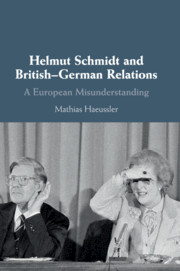Book contents
- Helmut Schmidt and British–German Relations
- Helmut Schmidt and British–German Relations
- Copyright page
- Contents
- Illustrations
- Acknowledgements
- Abbreviations
- Introduction
- 1 The Young Helmut Schmidt and British–German Relations, 1945–1974
- 2 Harold Wilson, 1974–1976
- 3 James Callaghan, 1976–1979
- 4 Margaret Thatcher, 1979–1982
- Conclusions
- Bibliography
- Index
3 - James Callaghan, 1976–1979
Published online by Cambridge University Press: 18 March 2019
- Helmut Schmidt and British–German Relations
- Helmut Schmidt and British–German Relations
- Copyright page
- Contents
- Illustrations
- Acknowledgements
- Abbreviations
- Introduction
- 1 The Young Helmut Schmidt and British–German Relations, 1945–1974
- 2 Harold Wilson, 1974–1976
- 3 James Callaghan, 1976–1979
- 4 Margaret Thatcher, 1979–1982
- Conclusions
- Bibliography
- Index
Summary
On 10 January 1979, a sun-tanned and visibly relaxed Prime Minister James Callaghan addressed the assembled press at London Heathrow airport after his return from the Caribbean island of Guadeloupe, where he had just spent two days discussing nuclear and security politics with US President Jimmy Carter, French President Giscard d’Estaing, and Helmut Schmidt. At home, however, the situation was dire. Having failed to renew Labour’s social contract with the trade unions a few months earlier, Callaghan’s government was faced with widespread industrial action, the lorry drivers’ strike that had started the week before now severely threatening the distribution of petrol and other essential supplies in Britain. When asked about his ‘view of the mounting chaos in the country’, however, Callaghan bluntly brushed off the interviewer’s question. ‘Well, that’s a judgment that you are making and I promise you that, if you look at it from outside – and perhaps you’re taking a rather parochial view at the moment – I don’t think that other people in the world would share the view that there is mounting chaos.’ ‘Now,’ he grumbled, ‘don’t you think that’s sufficient, after a 9 hour flight overnight … and no breakfast?’1 Next day, the Sun dashed out its famous headline ‘Crisis? What Crisis?’, fostering the image of a prime minister lacking grip and being out of touch with the British public.
- Type
- Chapter
- Information
- Helmut Schmidt and British-German RelationsA European Misunderstanding, pp. 100 - 148Publisher: Cambridge University PressPrint publication year: 2019



